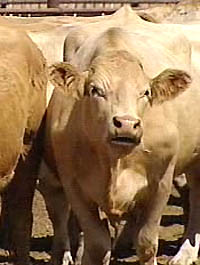 |
|||||||||
|
|||||||||||||||||||
|
|
Sheep producers also affected by BSE crisis  The
mad-cow crisis is not only crippling the cattle industry; Manitoba
sheep producers are also feeling a financial blow. The
mad-cow crisis is not only crippling the cattle industry; Manitoba
sheep producers are also feeling a financial blow.Eric Thornhill, former head of the Manitoba Sheep Association, says the sheep trade has dropped 40 to 50 per cent since Canada's first case of bovine spongiform encephalopathy was discovered in May 2003. Sheep producers were ready to market their animals in late fall, but because of the border closure, they've had to hold on to those animals. Even if they can find a market for their sheep, Thornhill says it's hard to find a slaughterhouse to accept them, with waiting lists as long as four months. Thornhill says the wait has caused some producers to slaughter and sell their own sheep, which worries him. " What happens when all the offal…you have nowhere to put it. You don't tell the authorities because you're doing it illegally, so it gets dumped in the bush. It has the potential to cause a bigger catastrophe with other diseases," he says. Thornhill says what Manitoba needs is a multi-species slaughterhouse. Sheep producers could then sell their sheep and benefit from government compensation. " The aggravating part is we doubled production in sheep – it's a great place to keep sheep, is Manitoba," he says. "There was so few, but we had doubled and we were really increasing an environmentally-friendly, a sustainable animal, and all this land in Manitoba that was suited, with a climate that suits them, and now we've got this blow knocking us back again." Monday marks the closing of a public comment period on a U.S. plan to start importing Canadian cattle under 30 months of age. It's hoped it would lead to opening the border to live cattle and other livestock, such as sheep, but the BSE case found in Washington state has put the border re-opening into question. |
||||||||||||||||||

|
|
||||||||||||||||||
| home | agri-services | pedigree
pen | news | dairy | beef | machinery | property | organisations | site map |
|||||||||||||||||||